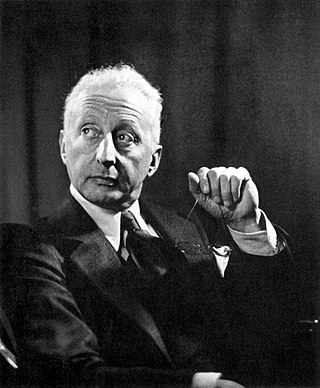
Jerome David Kern was an American composer of musical theatre and popular music. One of the most important American theatre composers of the early 20th century, he wrote more than 700 songs, used in over 100 stage works, including such classics as "Ol' Man River", "Can't Help Lovin' Dat Man", "A Fine Romance", "Smoke Gets in Your Eyes", "The Song Is You", "All the Things You Are", "The Way You Look Tonight" and "Long Ago ". He collaborated with many of the leading librettists and lyricists of his era, including George Grossmith Jr., Guy Bolton, P. G. Wodehouse, Otto Harbach, Oscar Hammerstein II, Dorothy Fields, Johnny Mercer, Ira Gershwin and Yip Harburg.

Anne Marsh Caldwell, also known as Anne Caldwell O'Dea, was an American playwright and lyricist. She wrote both pop songs and Broadway shows, sometimes working with composer Jerome Kern.
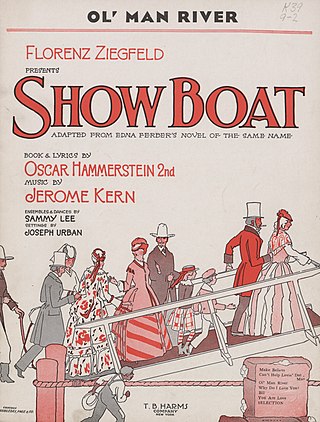
Show Boat is a musical with music by Jerome Kern and book and lyrics by Oscar Hammerstein II. It is based on Edna Ferber's best-selling 1926 novel of the same name. The musical follows the lives of the performers, stagehands and dock workers on the Cotton Blossom, a Mississippi River show boat, over 40 years from 1887 to 1927. Its themes include racial prejudice and tragic, enduring love. The musical contributed such classic songs as "Ol' Man River", "Make Believe", and "Can't Help Lovin' Dat Man".
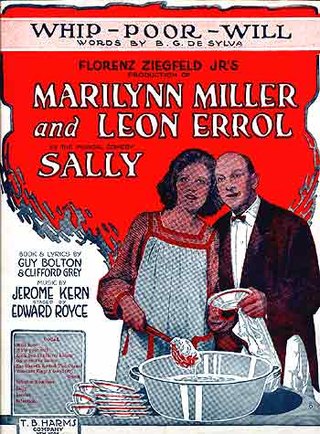
Sally is a musical comedy with music by Jerome Kern, lyrics by Clifford Grey and book by Guy Bolton, with additional lyrics by Buddy De Sylva, Anne Caldwell and P. G. Wodehouse. The plot hinges on a mistaken identity: Sally, a waif, is a dishwasher at the Alley Inn in New York City. She poses as a famous foreign ballerina and rises to fame through joining the Ziegfeld Follies. There is a rags to riches story, a ballet as a centrepiece, and a wedding as a finale. "Look for the Silver Lining" continues to be one of Kern's most familiar songs. The song is lampooned by another song, "Look for a Sky of Blue," in Rick Besoyan's satirical 1959 musical Little Mary Sunshine.

Marilyn Miller was one of the most popular Broadway musical stars of the 1920s and early 1930s. She was an accomplished tap dancer, singer and actress, and the combination of these talents endeared her to audiences. On stage, she usually played rags-to-riches Cinderella characters who lived happily ever after. Her enormous popularity and famed image were in distinct contrast to her personal life, which was marred by disappointment, tragedy, frequent illness, and ultimately her sudden death due to complications of nasal surgery at age 37.

Charles Bancroft Dillingham was an American theatre manager and producer of over 200 Broadway shows.
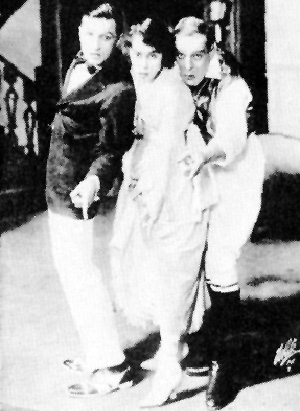
Oh, Boy! is a musical in two acts, with music by Jerome Kern and book and lyrics by Guy Bolton and P. G. Wodehouse. The story concerns befuddled George, who elopes with Lou Ellen, the daughter of Judge Carter. He must win over her parents and his Quaker aunt. His dapper polo champion friend Jim is in love with madcap actress Jackie, but George must hide her while she extricates herself from a scrape with a bumbling constable whom she punched at a party raid.
Victor Baravalle (1885–1939) was an Italian-born composer, music director, and conductor, best known for his work on both the stage and film productions of the Jerome Kern and Oscar Hammerstein II musical Show Boat.

Very Good Eddie is a musical with a book by Guy Bolton and Philip Bartholomae, music by Jerome Kern, and lyrics by Schuyler Greene, with additional lyrics by Elsie Janis, Herbert Reynolds, Harry B. Smith, John E. Hazzard, Ring Lardner and Jerome Kern, and additional music by Henry Kailimai. The story was based on the farce Over Night by Bartholomae. The farcical plot concerns three couples and a sex-crazed voice teacher who board a Hudson River Day Line boat in Poughkeepsie, New York. Chaos ensues when two of the couples cross paths and accidentally trade partners. The vaudeville-style adventure continues at a hotel, where guests pop in and out of rooms while an inebriated desk clerk tries to sort through the madness.
Sunny is a musical with music by Jerome Kern and a libretto by Oscar Hammerstein II and Otto Harbach. The plot involves Sunny, the star of a circus act, who falls for a rich playboy but comes in conflict with his snooty family. This show was the follow-up to the 1920 hit musical Sally, both starring Marilyn Miller in the title roles, and it was Kern's first musical together with Hammerstein. Sunny also became a hit, with its original Broadway production in 1925 running for 517 performances. The London production starred Binnie Hale.
Show Girl is a musical by William Anthony McGuire that ran from Jul 2, 1929 to Oct 5, 1929. A backstage musical, much of the action of the musical's story takes place at the Ziegfeld Theatre in New York City. Other scenes take place in Trenton, New Jersey; Brooklyn; and at a Penthouse apartment in New York City. The show tells the story of aspiring Broadway showgirl Dixie Dugan as she is pursued by four suitors. The music was written by George Gershwin, with lyrics by Ira Gershwin and Gus Kahn.
Mis'ry's Comin' Aroun' is a once-neglected song from the 1927 musical Show Boat by Jerome Kern and Oscar Hammerstein II. It was cut from the production during the Washington D.C. tryout on the orders of producer Florenz Ziegfeld, supposedly because it was one of the factors that made the show too long. However, musical theatre historian Miles Kreuger and conductor John McGlinn, also suggest that it was the dark, dramatic tone of the piece that most concerned Ziegfeld. Kern was reportedly so incensed by the deletion of "Mis'ry's Comin' Aroun'" that he made it the principal motif of Show Boats original overture and asked orchestrator Robert Russell Bennett to work sections of it into the background music as well, where it is now played by the orchestra during some of the dialogue scenes involving the mixed race actress Julie La Verne.
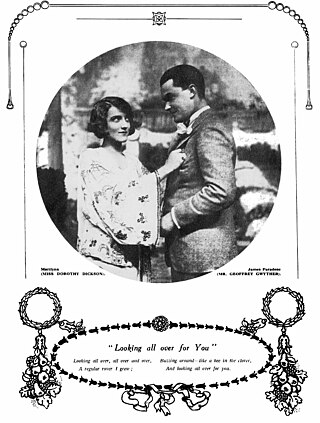
The Cabaret Girl is a musical comedy in three acts with music by Jerome Kern and book and lyrics by George Grossmith, Jr. and P. G. Wodehouse. It was produced by Grossmith and J. A. E. Malone at the Winter Garden Theatre in London's West End in September 1922 and featured Dorothy Dickson, Grossmith, Geoffrey Gwyther, and Norman Griffin in the leading roles.

Oh, Lady! Lady!! is a musical with music by Jerome Kern, a book by Guy Bolton and P. G. Wodehouse and lyrics by Wodehouse. It was written for the Princess Theatre on Broadway, where it played in 1918 and ran for 219 performances. The story concerns an engaged young man, Bill, whose ex-fiancée arrives unexpectedly on his wedding day. Bill works to convince his old flame that he was not worthy to marry her, but his clumsy efforts do not make him look good to his new fiancée, whose mother already dislikes Bill. A couple of crooks cause further complications.
Miss 1917 is a musical revue with a book by Guy Bolton and P. G. Wodehouse, music by Victor Herbert, Jerome Kern and others, and lyrics by Harry B. Smith, Otto Harbach, Henry Blossom and others. Made up of a string of vignettes, the show features songs from such musicals as The Wizard of Oz, Three Twins, Babes in Toyland, Ziegfeld Follies and The Belle of New York.
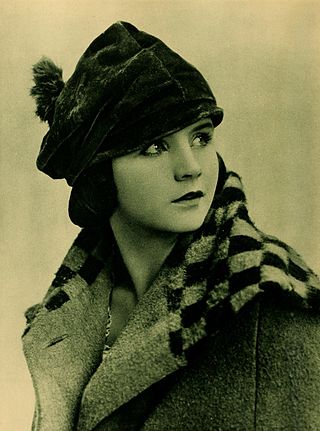
Mary Hay Caldwell was an American dancer, musical comedy and silent screen actress, playwright, and former Ziegfeld girl.

Criss Cross is a musical comedy in two acts and prologue, with book and lyrics by Otto Harbach and Anne Caldwell and music by Jerome Kern. Set in France and Algiers, the plot concerns a successful aviator, Christopher Cross who manages to help Captain Carleton save Dolly Day from the designing schemes of IIphrahim Benani to rob her of her birthright and a considerable fortune.

The Bunch and Judy is a musical comedy in two acts with book by Anne Caldwell and R. H. Burnside, lyrics by Anne Caldwell, and music by Jerome Kern. The story centered on a Broadway starlet, who marries a Scottish nobleman, only to grow disenchanted and return to show business and the man she loves.

The City Chap is a musical comedy with music by Jerome Kern, lyrics by Anne Caldwell and book by James Montgomery adapted from the play The Fortune Hunter by Winchell Smith.














